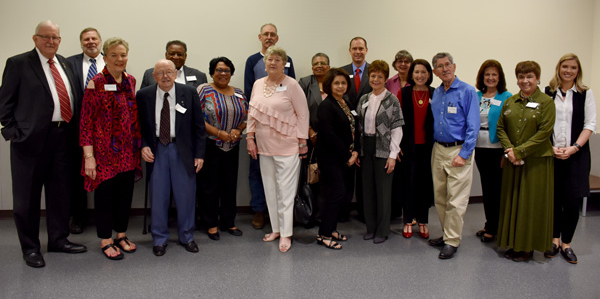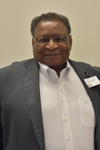Retired couple returns to UHV for Homecoming celebration

The University of Houston-Victoria recently welcomed retired university faculty, staff and their guests to a Homecoming luncheon, including a couple whose service to the university has impacted the lives of education students.
Roy and Ileen Foley taught in what was then UHV’s School of Education & Human Development. Roy was a professor who taught science education, classroom teaching skills and educational research. Ileen was an adjunct faculty member and taught curriculum and instruction as well as educational research.
During Thursday’s luncheon, former faculty, staff and their guests watched a presentation by UHV President Vic Morgan about the university’s plans for expansion. Morgan discussed the plan to break ground in May on the university’s science, technology, engineering and mathematics building, as well as plans for the Town Plaza Mall that UHV is in the process of renovating, an update on the progress of the new University Commons building and changes to Ben Wilson Street.
“So much of UHV’s success is due to the work of our faculty and staff,” said Jesse Pisors, vice president for advancement and external relations. “The history of the university’s growth and development is written by their work, and we are happy to honor these retirees during UHV Homecoming.”
Roy and Ileen have watched and helped UHV grow and succeed for decades. Ileen grew up in Victoria, and she remembers when the university was first founded in 1973. Before she started adjunct teaching at UHV, she retired from the Victoria Independent School District, where she worked for 32 years. She taught classes at UHV for about eight years.
“I thoroughly enjoyed my time at UHV,” she said. “When you work in education, you appreciate the importance of educating others. It felt good to see and help teachers develop before they went out to teach others.”
Roy joined UHV in 1989 after years working in the oil/chemical industry and for VISD. He remained a member of the university’s faculty until he retired in 2014. During that time, he served in leadership roles, including a brief stint as chair of the School of Education and a term as president of what would eventually become the UHV Faculty Senate.
In addition to teaching at the university, the Foleys also are UHV alumni. They each received education administration certifications from the university. They also have contributed to scholarships for the university’s education students, including the creation of the Roy & Ileen Foley Scholarship Endowment, which benefits undergraduate students majoring in education.
“We saw the scholarship as an opportunity to help future educators,” Roy said. “We’ve enjoyed our years of teaching, and we want to give others the opportunity to help people through education the way that we have.”
After all the time they have spent at UHV, the Foleys are excited to see how much the university has grown and the plans for future expansion.
“It’s amazing to see all the growth that’s been happening,” Ileen said. “UHV has gone from an annex on Victoria College’s campus to where it is today, and there is so much more in store. It’s just fantastic.”
The University of Houston-Victoria, located in the heart of the Coastal Bend region since 1973 in Victoria, Texas, offers courses leading to more than 80 academic programs in the schools of Arts & Sciences; Business Administration; and Education, Health Professions & Human Development. UHV provides face-to-face classes at its Victoria campus, as well as an instructional site in Katy, Texas, and online classes that students can take from anywhere. UHV supports the American Association of State Colleges and Universities Opportunities for All initiative to increase awareness about state colleges and universities and the important role they have in providing a high-quality and accessible education to an increasingly diverse student population, as well as contributing to regional and state economic development.
Lauren Hightower-Emerson
361-570-4342









